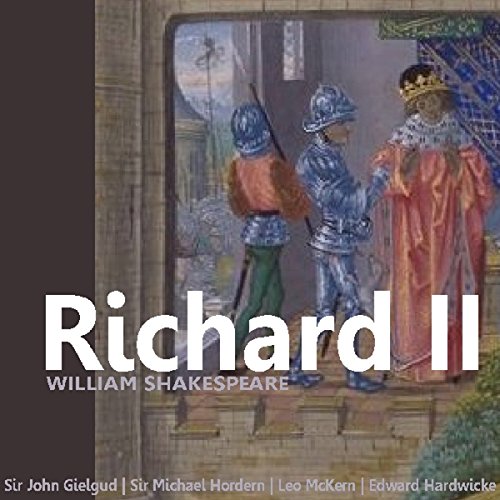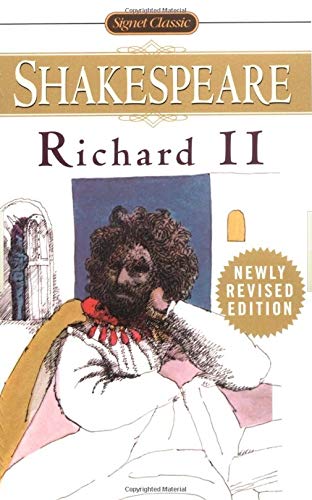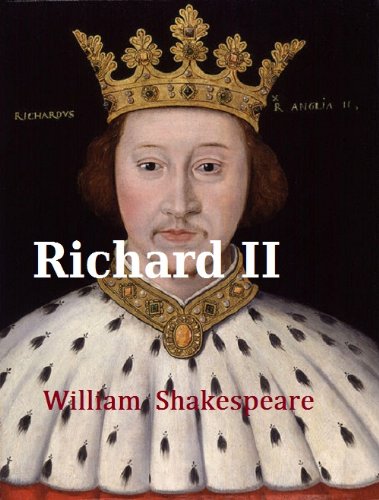-
Richard II
William Shakespeare, Bauer Books
eBook (Bauer Books, Feb. 4, 2020)For the first time, Shakespeare creates a compelling historical protagonist who speaks naturally in a poetic voice that is distinctively his own. In his earlier works involving kings and emperors, Shakespeare imitated Marlowe's "mighty line" with some--if not complete--success (Richard III was inherently Marlovian, which helped) but in Richard II he at last found a king--a weak man but a considerable poet, with an eye for detail--whom he could animate from the inside, a king more comfortable with the rhetoric of royal pageantry than with the governing his country.Like Hamlet, Richard and his language dominate the play which he inhabits, and the downside to this is that the play inevitably loses a little of its light and beauty whenever he is not on the stage.
-
Richard II
William Shakespeare, John Gielgud, Michael Hordern, Leo McKern, Edward Hardwicke, Saland Publishing
Audiobook (Saland Publishing, Dec. 28, 2010)Sir John Gielgud, Sir Michael Hordern, Leo McKern, and Edward Hardwicke star in this unabridged performance of Shakespeare's Richard II.
-
Richard II
William Shakespeare, Kenneth Muir
Mass Market Paperback (Signet, Jan. 1, 1999)Considered one of Shakespeare's greatest history plays, The Tragedy of King Richard II concerns the ill-fated reign of a king whose eventual overthrow marks the beginning of Shakespeare's history cycle, including Henry IV, Part I, Henry IV Part II; and Henry V.This edition features an overview of Shakespeare's works by Sylvan Barnet, former Chairman of the English Department at Tufts University, as well as a comprehensive stage and screen history, dramatic criticism from the past and present, and sources from which Shakespeare derived this great work. Z+
Z+
-
Richard II
William Shakespeare
eBook (, Jan. 29, 2011)King Richard the Second is a history play by William Shakespeare believed to be written in approximately 1595. It is based on the life of King Richard II of England (ruled 1377–1399) and is the first part of a tetralogy, referred to by some scholars as the Henriad, followed by three plays concerning Richard's successors: Henry IV, part 1, Henry IV, part 2, and Henry V. It may not have been written as a stand-alone work.Although the First Folio (1623) edition of Shakespeare's works lists the play as a history play, the earlier Quarto edition of 1597 calls itself The tragedie of King Richard the second.Per Wikipedia
-
Richard II
William Shakespeare
language (, Jan. 29, 2011)King Richard the Second is a history play by William Shakespeare believed to be written in approximately 1595. It is based on the life of King Richard II of England (ruled 1377–1399) and is the first part of a tetralogy, referred to by some scholars as the Henriad, followed by three plays concerning Richard's successors: Henry IV, part 1, Henry IV, part 2, and Henry V. It may not have been written as a stand-alone work.Although the First Folio (1623) edition of Shakespeare's works lists the play as a history play, the earlier Quarto edition of 1597 calls itself The tragedie of King Richard the second.Per Wikipedia
-
Richard II: Annotated
William Shakespeare
eBook (, May 24, 2020)Lord Richard the Second is a history play by William Shakespeare accepted to be written in roughly 1595. It depends on the life of King Richard II of England and is the initial segment of a quadruplicate, alluded to by researchers as the Henriad, trailed by three plays concerning Richard's replacements: Henry IV, section 1, Henry IV, section 2, and Henry V. It might not have been composed as an independent work.
-
Richard II
William Shakespeare
eBook (, April 13, 2020)King Richard the Second is a history play by William Shakespeare believed to be written in approximately 1595. It is based on the life of King Richard II of England and is the first part of a tetralogy, referred to by scholars as the Henriad, followed by three plays concerning Richard's successors: Henry IV, part 1, Henry IV, part 2, and Henry V. It may not have been written as a stand-alone work.
-
Richard II
William Shakespeare
eBook (WS, Sept. 12, 2018)King Richard the Second is a history play by William Shakespeare believed to be written in approximately 1595. It is based on the life of King Richard II of England and is the first part of a tetralogy, referred to by scholars as the Henriad, followed by three plays concerning Richard's successors: Henry IV, part 1, Henry IV, part 2, and Henry V. It may not have been written as a stand-alone work.
-
Richard II
William Shakespeare
eBook (, Oct. 24, 2017)Richard II a history by William Shakespeare published in 1595Summary : King Richard the Second is a history play by William Shakespeare believed to be written in approximately 1595. It is based on the life of King Richard II of England and is the first part of a tetralogy, referred to by scholars as the Henriad, followed by three plays concerning Richard's successors: Henry IV, part 1, Henry IV, part 2, and Henry V. It may not have been written as a stand-alone work.The play spans only the last two years of Richard's life, from 1398 to 1400. The first Act begins with King Richard sitting majestically on his throne in full state, having been requested to arbitrate a dispute between Thomas Mowbray and Richard's cousin, Henry Bolingbroke, later Henry IV, who has accused Mowbray of squandering money given to him by Richard for the king's soldiers and of murdering Bolingbroke's uncle, the Duke of Gloucester. Bolingbroke's father, John of Gaunt, 1st Duke of Lancaster, meanwhile, believes it was Richard himself who was responsible for his brother's murder. After several attempts to calm both men, Richard acquiesces and it is determined that the matter be resolved in the established method of trial by battle between Bolingbroke and Mowbray, despite the objections of Gaunt.Extrait : KING RICHARD.Old John of Gaunt, time-honoured Lancaster,Hast thou, according to thy oath and band,Brought hither Henry Hereford thy bold son,Here to make good the boisterous late appeal,Which then our leisure would not let us hear,Against the Duke of Norfolk, Thomas Mowbray?GAUNT.I have, my liege.KING RICHARD.Tell me, moreover, hast thou sounded himIf he appeal the Duke on ancient malice,Or worthily, as a good subject should,On some known ground of treachery in him?GAUNT.As near as I could sift him on that argument,On some apparent danger seen in himAim'd at your Highness, no inveterate malice.KING RICHARD.Then call them to our presence: face to faceAnd frowning brow to brow, ourselves will hearThe accuser and the accused freely speak.High-stomach'd are they both and full of ire,In rage, deaf as the sea, hasty as fire.[Re-enter Attendants, with BOLINGBROKE and MOWBRAY.]BOLINGBROKE.Many years of happy days befallMy gracious sovereign, my most loving liege!MOWBRAY.Each day still better other's happinessUntil the heavens, envying earth's good hap,Add an immortal title to your crown!KING RICHARD.We thank you both; yet one but flatters us,As well appeareth by the cause you come;Namely, to appeal each other of high treason.Cousin of Hereford, what dost thou objectAgainst the Duke of Norfolk, Thomas Mowbray?BOLINGBROKE.First,—heaven be the record to my speech!—In the devotion of a subject's love,Tendering the precious safety of my prince,And free from other misbegotten hate,Come I appellant to this princely presence.Now, Thomas Mowbray, do I turn to thee,And mark my greeting well; for what I speakMy body shall make good upon this earth,Or my divine soul answer it in heaven.Thou art a traitor and a miscreant;Too good to be so and too bad to live,Since the more fair and crystal is the sky,The uglier seem the clouds that in it fly.Once more, the more to aggravate the note,Biography : William Shakespeare born in 1564 and dead in 1616 was an English poet, playwright and actor, widely regarded as the greatest writer in the English language and the world's pre-eminent dramatist.[2] He is often called England's national poet and the "Bard of Avon". His extant works, including collaborations, consist of approximately 38 plays, 154 sonnets, two long narrative poems and a few other verses, some of uncertain authorship. His plays have been translated into every major living language and are performed more often than those of any other playwright
-
Richard II
William Shakespeare, Jayanta Sarkar
eBook (Jyoti Pvt. Ltd., May 28, 2019)Richard II is not only a political play but also something more. The figure of Richard is the focus of interest. Furthermore, in the development of the character we perceive the germs of Shakespearean tragedy. Richard II proclaims the great theme of the whole cycle of Shakespeare’s History Plays. It may be an Imperfect play, but it is perfectly planned as part of a great structure. It depicts Shakespeare’s epic vision of England of the era of king Richard II.
-
Richard II
William Shakespeare
eBook (, May 26, 2018)King Richard the Second is a history play by William Shakespeare believed to be written in approximately 1595. It is based on the life of King Richard II of England and is the first part of a tetralogy, referred to by scholars as the Henriad, followed by three plays concerning Richard's successors: Henry IV, part 1, Henry IV, part 2, and Henry V. It may not have been written as a stand-alone work.
-
Richard II:
William Shakespeare
eBook (, Aug. 24, 2018)King Richard II is a history play by William Shakespeare believed to have been written in approximately 1595. It is based on the life of King Richard II of England (ruled 1377–1399) and is the first part of a tetralogy, referred to by some scholars as the Henriad, followed by three plays concerning Richard's successors: Henry IV, Part 1; Henry IV, Part 2; and Henry V.Although the First Folio (1623) edition of Shakespeare's works lists the play as a history play, the earlier Quarto edition of 1597 calls it The tragedy of King Richard the second.